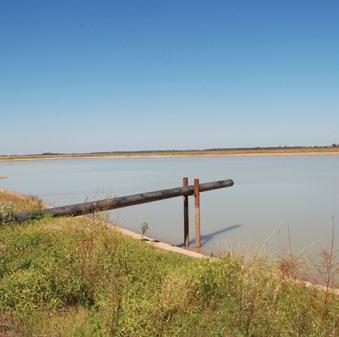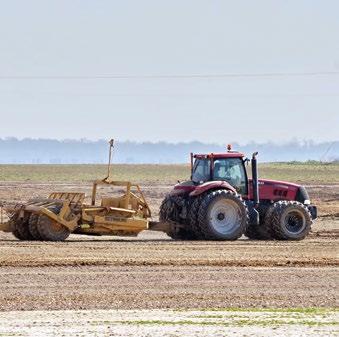
4 minute read
Something in the Water
from Arkansas Grown
Groundwater Conservation Leads to Tax Breaks
Conserving groundwater, one of the state’s most precious natural resources, has been a goal of Arkansas’s agriculture industry and state government leaders for decades. The Arkansas Department of Agriculture is working to get the word out to more Arkansas producers about a state tax credit program that helps offset the cost of implementing groundwater conservation practices. The Water Conservation Tax Credit Program was established by the Arkansas Legislature in 1985 to assist producers in their efforts to conserve groundwater. All Arkansas farmers are eligible for tax credits for specific conservation measures including surface impoundments and land leveling. In 1991, the Legislature enacted a law to identify critical ground water areas in the state. Critical ground water areas are defined as regions with significant declines in groundwater or degradation of water quality. Critical areas include parts of 18 counties in eastern and southern Arkansas, including all of Lonoke, Prairie, Jefferson, Arkansas, Ouachita, Calhoun, Bradley, Columbia, Phillips, and Union Counties. Monroe County in eastern Arkansas was added to the list in 2019. Farmers in the critical areas are eligible for a higher percentage of tax credit assistance from the state for certain improvements, and they may be eligible for additional benefits under some federal conservation programs, including the Environmental Quality Incentives Program (EQIP) administered by the United States Department of Agriculture’s Natural Resources Conservation Service. Arkansas ranks fourth in the nation for total water use and second in the U.S. for groundwater withdrawals. In the past five years, an estimated 15,200 acrefeet of groundwater has been conserved due to the construction of 57 surface water conversion projects that were approved for a state tax credit. As of fall 2019, more than 25,000 farm acres were covered under the tax credit program.
Advertisement
Kathryn Stewart with the Arkansas Department of Agriculture’s Natural Resources Division sees opportunity for more producers to participate in the tax credit program, and she is working to make more producers in the critical groundwater areas aware of the program and its benefits. “The main goal is to keep pushing this program and get as many people to apply for a tax credit as we can,” Stewart said. “The tax credit is a great tool to help producers afford the cost of water conservation practices and protect our groundwater resources for the next generation.” Farmers may claim a 50% tax credit, up to $9,000 each taxable year, for costs incurred in construction, installation or restoration of a reservoir, or holding pond, of at least 20 acre-feet. This tax credit allows farmers to claim up to $90,000 over a 16-year period. Farmers may receive a 10% credit for land-leveling, up to $9,000 each year, with a total credit of $27,000. In critical areas, farmers who convert from groundwater to surface water are eligible for a credit of up to 50% of the total project costs. Outside critical areas, that credit is 10%. Similarly, a 50% credit is available for the cost of water meters installed on wells in critical areas, and a 10% credit in noncritical areas. “Arkansas farmers understand better than almost anyone the importance and value of water, and some have learned it the hard way when they turned on their well and nothing came out.”
To be eligible for the credit, an application must be submitted to the local county conservation district and to the Natural Resources Division before construction begins.
Brantley Farms of Lonoke County has participated in the tax credit program and has seen the benefits firsthand.
“We used the state’s tax credit program to help offset the cost of land leveling and building a reservoir,” said Dow Brantley. “Producers want to do their part to conserve groundwater but the upfront costs of installing conservation practices are expensive. The state’s tax credit program helps make them more affordable.”
Stewart understands concerns about the upfront expense of instituting conservation practices but warns that the long-term impact could be more significant.
“Arkansas farmers understand better than almost anyone the importance and value of water, and some have learned it the hard way when they turned on their well and nothing came out,” Stewart said. “We want to help producers take steps now to conserve the state’s groundwater so future generations can participate in Arkansas’s great agricultural history.”

Arkansas Department of Agriculture staff will have information about the Water Conservation Tax Credit Program available at meetings across the state and are available to make presentations about the program. For more information about the tax credit program or to schedule a presentation, contact Stewart at (501) 682-3972 or email kathryn.stewart@arkansas.gov.
More information about the program also can be found at agriculture.arkansas.gov.











